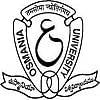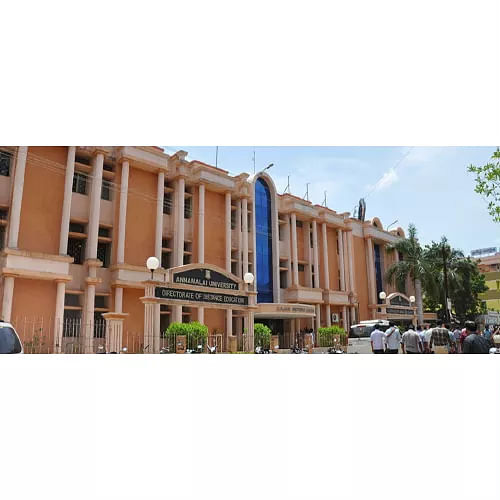MBA in Product Management: Course Details, Eligibility, Fees, Admission, Duration

MBA in Product Management is a two-year programme designed to cultivate practical expertise and essential skills in the strategic realm of product development. The MBA Product Management curriculum delves deeply into the strategic aspects of product lifecycle management, market analysis, user-centered design, and innovative problem-solving techniques.
As part of the admission process for MBA in Product Management, eligible applicants are required to hold a Bachelor's degree from a recognized university with a minimum aggregate score of 50%. A relaxation of 5% is offered to candidates belonging to the SC/ST/PwD category. Universities consider entrance exams such as CAT, MAT, XAT, NMAT, etc. as part of the selection process. MBA in Product Management fees range between INR 15,000 and INR 30 LPA.
Table of Contents
- What is MBA in Product Management?
- MBA in Product Management Eligibility Criteria
- Why Choose an MBA Product Management Course?
- MBA in Product Management Admission 2023
- MBA in Product Management Entrance Exam 2023
- Top MBA in Product Management Colleges with Fee Details
- MBA Product Management Syllabus and Subjects
- MBA in Product Management vs. MBA in Project Management
- Courses After MBA in Product Management
- Salary After MBA in Product Management
- Career Options After MBA in Product Management
- Skills Required for an MBA in Product Management
MBA in Product Management Course Details
| Degree | Masters |
| Full Form | Master of Business Administration in Product Management |
| Duration | 2 Years |
| Age | No age limit |
| Entrance Exam | CAT, MAT, XAT, NMAT, CMAT |
| Minimum Percentage | A minimum of 50% marks in a Bachelor's Degree [Relaxations of 5% for reserved category candidates] |
| Average Fees | ₹2 - 15 LPA |
| Average Salary | INR 2 -15 LPA |
| Employment Roles | Consultant, Strategist, Business Development Executive, Administrator, Supply Chain Manager, Product Analyst, Product Marketing Manager |
| Top Recruiters | Amazon, Wipro, TCS, ICICI Bank, Reliance Jio, Flipkart, Bharti Airtel, IBM |
What is MBA in Product Management?
MBA in Product Management equips individuals with essential skills for excelling in the intricate field of product management. Graduates develop business acumen, technical proficiency, strategic thinking, and critical skills like market analysis, prototype creation, and project management upon completion of the course. The course is one of the key specializations under MBA courses. ISBR, Amity University, etc., are some top universities that offer MBA Product Management course.
The job scope for MBA in Product Management in India is broad and students can bag job roles like Product Consultants, Product Managers, Business Development Executives, Purchase Managers, etc., in top companies like Amazon, Wipro, TCS, ICICI Bank, etc.
MBA in Product Management Eligibility Criteria
The general eligibility criteria for MBA in Production Management in most universities and institutions include the following:
- A recognized Bachelor's degree in any discipline from a reputed institution.
- A minimum aggregate score of around 50%, with relaxations of 5% for candidates belonging to SC/ST/PwD categories.
- Qualifying scores in relevant management entrance exams like CAT, MAT, XAT, or equivalent, as specified by the respective university or institute.
- Proficiency in English is demonstrated through scores in tests like TOEFL or IELTS (for international applicants).
- Successful completion of any additional admission processes or interviews conducted by the university or institute.
Why Choose an MBA Product Management Course?
MBA in Product Management equips students not only with a degree but with a potent arsenal of skills that sets them apart as strategic thinkers, innovation drivers, and valuable assets to any organization. Here are some important reasons why students can opt for this program:
- Specialized Proficiency: Pursuing an MBA Product Management equips you with finely tuned knowledge and hands-on skills designed to excel in the fiercely competitive realm of product development. Notably, experienced product managers command an average CTC of INR 10.76 LPA, a figure that stands at least twice as high as India's national average wage of 3.87 LPA.
- Networking Opportunities: MBA programs often offer a platform to connect with industry experts, fellow students, and alumni, opening doors to valuable contacts and potential career opportunities.
- Diverse Career Avenues: Graduates find themselves qualified for an array of roles including Product Managers, Innovation Strategists, and Business Development Leaders, spanning various industries. The top B-Schools have reported a 7% increase in placement rates in the department of product management.
- Interdisciplinary Approach: You'll gain a comprehensive understanding of market analysis, user-centric design, and data-driven decision-making, fostering cross-functional collaboration.
- Strategic Mindset: The program hones your ability to think strategically, enabling you to navigate complexities, anticipate market trends, and drive successful product life cycles.
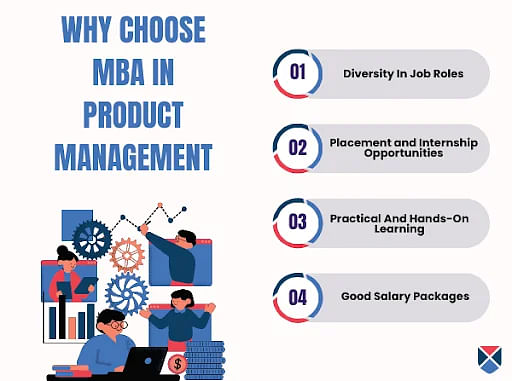
Also, Check: Top Reasons to Pursue an MBA
MBA in Product Management Admission 2023
Admission to the MBA in Product Management program is accessible through a combination of entrance examinations and merit-based selection. Numerous universities extend admission options, including direct entry and entrance exam-based routes, for the MBA Product Management course.
Here is an outline of the admission procedure and selection process followed by most universities and institutions:
Application Process:
- Step 1. Applications for the MBA in Product Management degree course can be submitted online through the university's official website or offline by visiting the admissions office.
- Step 2. Some colleges may conduct entrance tests, personal interviews, and group discussions as part of the admission process to assess candidates' communication skills.
Selection Process:
The selection process for the MBA in Product Management program is generally consistent across specializations.
- Colleges determine the final selection based on candidates' performance in entrance exams and their undergraduate degree merit.
- Marks obtained in entrance exams and academic performance are key factors influencing the selection of candidates for the MBA in Product Management program in India.
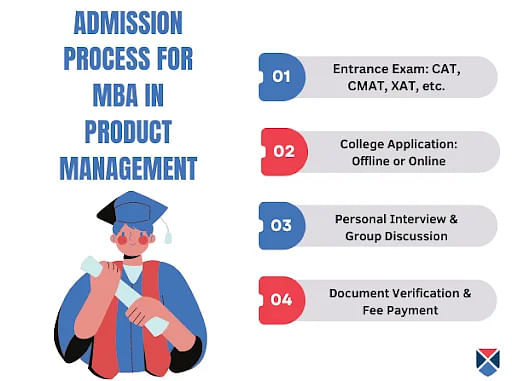
Read More on MBA Admission Process
MBA in Product Management Entrance Exam 2023
MBA in Product Management course admissions are primarily based on entrance exams conducted at both national and state levels. Various management entrance exams serve as a gateway for admission to reputed institutes offering MBA Product Management programs. Some of the prominent entrance exams for MBA Product Management are detailed in the table below:
|
MBA Entrance Exam |
Registration Date |
Accepting Colleges |
|
Aug 2 - Sep 13, 2023 |
ISBR, Amity University |
|
|
Jul 15 - Nov 30, 2023 |
ISBR, Amity University |
|
|
Aug 17 - Sep 14, 2023 |
ISBR, Amity University |
|
|
February 2024 (Tentative) |
ISBR, Amity University |
|
|
Aug 1 - Oct 10, 2023 |
ISBR, Amity University |
|
|
Jun 3 - Jul 16, 2023 |
ISBR, Amity University |
Top MBA in Product Management Colleges with Fee Details
Some institutions offer an MBA in Product Management, while some institutions offer product management as a specialization in their second-year syllabus. Detailed in the table below is a list of institutions and universities offering this course along with their average fees:
|
Sl.No. |
University |
Admission Fee |
Miscellaneous Fee |
Tuition Fee |
|
1. |
INR 50,000 |
INR 1.80 LPA |
INR 6.40 LPA |
|
| 2. |
NICMAR |
INR 5,000 |
INR 10,000 |
INR 5 LPA |
MBA Product Management Syllabus and Subjects
The MBA Product Management syllabus offers a comprehensive and multidisciplinary curriculum, encompassing various management domains to equip students with essential knowledge and specialised skills.
Furthermore, the program emphasizes industry interactions and case-based learning, providing students with valuable insights into contemporary business practices and trends. Like most other specialised MBA programs the curriculum is divided into core and elective courses.
Core MBA in Product Management Subjects
The core courses go beyond imparting practical knowledge; they offer case-based lessons and collaborative learning models, enabling students to develop analytical, decision-making, and leadership skills rather than mere theoretical understanding. Listed below are some core courses in the MBA in Product Management syllabus
|
Topics Covered |
Core Courses |
|
Foundations of Management |
Managerial Concepts, Economy and Policy, Business Ethics, and Methodology. |
|
Organizational Behaviour |
Organizational Behaviour, Organisation Design. |
|
Product Marketing and Operations Management |
Product Market Analysis and Research, Project Management, and Accounting. |
|
Human Resources Management |
Human Resources Management, Managerial Skills for Effectiveness. |
|
Strategic Product Management |
Project Management and Risk, Supply Chain and Logistics, Negotiation and Conflict Resolution, Product Marketing and Branding, Brand Management, Innovation and Design. |
|
Business Analytics |
Business Statistics and Analytics for Decision Making, Data and Analytics, and Advanced Product Marketing. |
MBA in Product Management Elective Subjects
Elective subjects in the MBA in Product Management syllabus offer the flexibility to choose courses based on the interest of the student, some of which can be listed as follows
|
Topics |
Subjects Covered |
|
E-commerce and Digital Marketing |
E-commerce Strategy and Implementation, Online Consumer Behavior, Digital Marketing Analytics, Mobile Commerce and Apps, E-commerce Platforms and Technologies |
|
Technology Trends and Disruption |
Emerging Technologies and Business Transformation, Blockchain and Cryptocurrencies, Artificial Intelligence and Machine Learning for Business, Augmented Reality and Virtual Reality in Marketing |
|
Product Innovation and Design Thinking |
Design Thinking and User-Centred Innovation, New Product Development Strategies, Innovation Management and Creativity, Prototyping and Rapid Product Iteration, Managing Innovation Ecosystems |
|
Digital and Social Media Marketing |
Social Media Marketing Strategies, Influencer Marketing and Online Communities, Content Creation and Storytelling, Social Media Analytics and Measurement, Social Media Campaign Management |
|
Quality Toolkit For Managers |
Total Quality Management (TQM), Six Sigma and Lean Management, ISO Standards and Quality Assurance, Quality Control and Process Improvement, Statistical Methods for Quality Management |
Read More: MBA in Product Management Syllabus
MBA in Product Management vs. MBA in Project Management
To gain a clear understanding of an MBA in Product Management, we can compare it with an MBA in Project Management. These two specialized courses offer unique perspectives within the realm of business management. Given below are the basic differences between the two courses:
|
Parameters |
MBA in Product Management |
MBA in Project Management |
|
Full Form |
Masters of Business Administration in Product Management |
Master of Business Administration in Project Management |
|
Overview |
MBA in Product Management focuses on creating and managing innovative products and their market success |
MBA in Project Management centers around the efficient execution of projects within defined constraints |
|
Duration |
2 years |
2 years |
|
Eligibility |
50% in graduation for unreserved category and 45% for SC/ST/PwD students |
50% in graduation for unreserved category and 45% for SC/ST/PwD students |
|
Job Role |
Consultant, Strategist, Business Development Executive, Administrator, Supply Chain Manager, Product Analyst, Product Marketing Manager |
Project Manager, Engineering Project Manager, Operations Manager, Senior Test Engineer, Operations Project Manager, Software Development Project Manager |
|
Average Fee |
INR 15,000 - INR 30 LPA |
INR 1 LPA - INR 5 LPA |
|
Average Salary |
INR 2 LPA - INR 15 LPA |
INR 6 LPA - INR 15 LPA |
Read More: MBA in Project Management
Courses After MBA in Product Management
After completing an MBA in Product Management, students can further enhance their expertise and career prospects by considering various courses and paths. Here are some options to consider:
- Executive MBA (EMBA): A specialized MBA program designed for experienced professionals seeking advanced management education.
- Doctorate of Philosophy (Ph. D): An advanced research degree in the subject for students interested in pursuing academic or research careers.
- Post Graduate Programs: Industry-specific certifications to gain expertise in areas like digital marketing, project management, data analytics, etc.
- Post Graduate Diploma in Supply Chain and Logistics Management: Deepen your understanding of supply chain dynamics, logistics operations, and demand forecasting to optimise product delivery processes.
Salary After MBA in Product Management
MBA in Product Management graduates can explore a wide range of opportunities in sectors such as finance, consulting, healthcare, technology, hospitality, and more with an average salary range of INR 2-15 LPA. The versatility of the MBA in Product Management program equips graduates with the skills to thrive in diverse roles and industries, making it a stepping stone for a rewarding and successful career.
|
Positions |
Job Description |
Average Salary (For Freshers) |
Average Salary (5 Years of Work Experience) |
|
Product Manager |
Responsible for overseeing the entire lifecycle of a product, coordinating cross-functional teams, conducting market research, and making strategic decisions to ensure product success |
INR 5.1 LPA |
INR 15 LPA |
|
Business Development Executive |
Identifying new business opportunities, establishing partnerships, and driving sales growth |
INR 1.7 LPA |
INR 4 LPA |
|
Product Consultant |
Providing advice to organisations on various challenges and helping them improve their performance |
INR 6.5 LPA |
INR 20 LPA |
|
Supply Chain Manager |
Manages the end-to-end supply chain process to ensure products are delivered efficiently and meet customer demands |
INR 3.6 LPA |
INR 6 LPA |
|
Product Analyst |
Analyses market trends, customer feedback, and data to provide insights that guide product development and decision-making |
INR 3 LPA |
INR 12.5 LPA |
[Source: AmbitionBox]
Career Options After MBA in Product Management
After graduating with an MBA in Product Management, candidates will be equipped for a variety of exciting and strategic roles in the business world. Here's a list of potential job roles offered after completing an MBA in Product Management:
- Product Manager
- Market Research Analyst
- Innovation Manager
- Business Development Manager
- Product Strategist
- Products Portfolio Manager
- Product Analyst
Top Recruiters for MBA in Product Management Graduates
In a landscape of active infrastructural, agricultural, and governmental projects, specialized MBA graduates in Product Management find abundant job prospects. The evolving market dynamics and technological advancements offer diverse roles in both private and public sectors. Below is a list of top recruiters known for their competitive salary range
|
Top Recruiters |
Average Salary |
|
Amazon |
INR 37.7 LPA |
|
Wipro |
INR 18.5 LPA |
|
TCS |
INR 15 LPA |
|
ICICI Bank |
INR 13.5 LPA |
|
Reliance Jio |
INR 18.1 LPA |
|
Flipkart |
INR 32.2 LPA |
|
Bharti Airtel |
INR 22 LPA |
|
IBM |
INR 21 LPA |
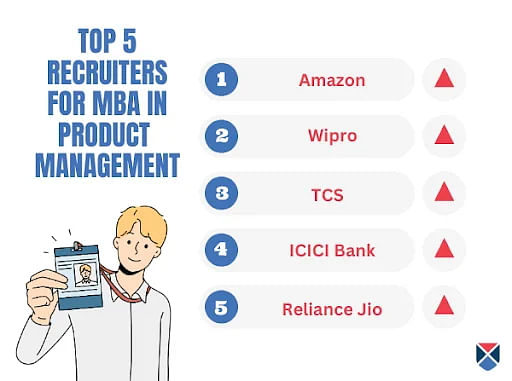
Read More: Career Options After MBA in Product Management
Skills Required for an MBA in Product Management
Here are some key technical and soft skills that distinguish an exceptional MBA in Product Management graduate:
- Strategic Vision: The ability to formulate and articulate a long-term plan that aligns with business goals and market trends.
- Data-Driven Decision Making: Utilising relevant data and insights to make informed and effective business choices.
- Leadership Abilities: Guiding and motivating cross-functional teams toward successful product development and launch.
- Product Development: Conducting market research and developing products as per the needs of customers.
- Tech Savviness: Being knowledgeable about technology trends and leveraging them to enhance product strategies.
- Effective Communication: Clearly conveying ideas and plans to diverse stakeholders, both within and outside the organization.
- Innovative Thinking: Generating novel ideas and approaches to stand out in a competitive market.
- Business Competency: Should know the difference between revenue and profit and knowledge of budgeting and cash flow in the product management process.
Top MBA in Product Management Colleges
Top Management Entrance Exams
MBA in Product Management Fee Structure
FAQs on MBA in Product Management
Q: What is an MBA in Product Management?
Q: What are the key skills gained from an MBA in Product Management?
Q: Who is eligible for an MBA in Product Management?
Q: What are the subjects in MBA Product Management?
Q: What is the salary of a product manager in India post-MBA?
Q: What is the average fees for MBA in Product Management?
Q: Which companies recruit MBA in Product Management graduates?



